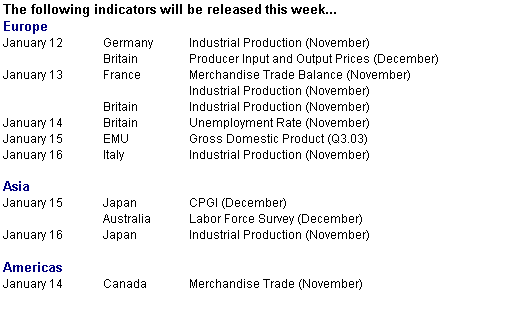Monday, January 12, 2004

Last Week's Highlights
ECB, Bank of England meet
The European Central Bank and Bank of England both met last week and left monetary policy unchanged as expected. The ECB's current interest rate is 2 percent while the Bank of England's is a substantially higher 3.75 percent. Bank of England watchers will have to wait until Wednesday, January 21 to find out the thinking of the monetary policy committee. ECB watchers only had to count down the 45 minutes between the policy announcement and the press conference that follows.
In the introductory remarks at his monthly press conference, ECB President Jean Claude Trichet benignly acknowledged that the current strength of the euro against the dollar could impact the rate of GDP growth in the EMU. He also said that exporters were feeling the pinch but that increasing worldwide growth should partially offset the currency impact. He went on to say that currency movements are only one part of the monetary policy equation. But while he stopped short of expressing unease with the euro's rapid rise, he also declined - when asked by reporters - to say that a strong currency is in the interest of the euro area, something he had said only a month before. Market watchers were disappointed, and the dollar continued its tumble against the euro and virtually all other currencies. The dollar hit an 11-year low against the pound sterling.

The European Central Bank uses an inflation target of below 2 percent as its primary focus to monetary policy. Usually when a currency rises in value, the price of imports fall, which in turn reduces the threat of inflation. However, EMU inflation has remained stubbornly above 2 percent, all but nullifying any thought of lowering interest rates to encourage growth. Growth in Europe has trailed Britain, Japan and the United States.
The British pound sterling and euro were not the only currencies to climb at the expense of the dollar. Both the Canadian and Australian dollars also rose to multi-year highs. The impact of the declining U.S. currency against the Canadian dollar was particularly apparent in last week's industrial product price index. When compared with last year, the IPPI sank by 4 percent. However when the exchange rate is taken into account, prices would have risen by 1 percent. And in Australia, the impact of its soaring currency has taken a toll on exports. (See indicator scoreboard below)

The yen remained in a narrow trading range as the Bank of Japan vigorously - but covertly - intervened to sell the currency. They continue to maintain a policy of currency intervention in order to keep their export-driven recovery alive.

Global Stock Markets
At the end of the first full trading week of 2004, equities were mixed. Equities experienced an exuberant Monday, but then things became more uncertain. And on Friday, Asian markets were already closed before the release of the disastrous U.S. employment report, but investors in Europe were certainly depressed by the news. Optimists on the economy received a rude shock after the surprisingly weak employment report called into question the labor market's recovery and all but crushed expectations of a mid-year rise in U.S. interest rates.
And bonds also reacted to the employment report. U.S. Treasury prices rose sharply - sending the benchmark 10-year Treasury yield to its lowest level in three months - after nonfarm payrolls rose by only 1,000 in December while October and November payroll figures were revised lower.
Global Stock Market Recap

Europe and Britain
The FTSE 100 ended the week lower as its record-equaling run of 12 successive positive days came to an end. But that did not stop investors from seeking out cyclical, growth-oriented stocks that are positioned for recovery. Technology, media and telecoms all posted strong gains as did the oil sector. However, Shell shocked the markets on Friday when the company announced a 20 percent reduction in its proven oil and gas reserves. Global economic data are steadily improving - Friday's disappointing U.S. data notwithstanding - and more and more bears are being forced to buy the cyclical stocks they under-own. And the start of a new investing year has exacerbated this effect. The CAC and DAX also slipped on Friday after the weak U.S. jobs data raised concerns about the pace of the economic recovery while the surprising downgrade of Shell's reserves sent oil majors lower.

Asia
Asian markets formally began the trading year on an exuberant note as renewed optimism about the region's economic prospects continued to encourage buying. Export-related stocks in Tokyo were lifted by a dollar rally (after intervention) against the yen. Asian markets were closed at the time the U.S. employment situation report was released, and no doubt there will be a reaction to that report and to Friday's losses in world indexes. Underlying the good performance in Japanese stocks lurks worries that the Bank of Japan will not be able to contain the value of the yen, which would hurt exporters - and the economy's recovery.

Singapore's Straits Times Index rose for an 11th day, while Hong Kong's Hang Seng advanced for a 10th. They gained 3.4 percent and 4.6 percent, respectively, last week.

Indicator scoreboard
EMU - December Reuters services purchasing managers survey dropped to 56.6 from 57.5 in the prior month. The index also was down for Germany, France and Italy. An index reading over 50 means that business activity is expanding. The composite index for manufacturing and services declined to 55.8 from 56.2 in November on slower new orders growth and slightly faster job losses.

December flash harmonized index of consumer prices was up 2.1 percent when compared with last year. In order to compute the flash estimate, Eurostat uses early price information provided by Germany, Italy and - if available - by other EMU members, as well as early information about energy prices.

October seasonally adjusted industrial orders were up 1.6 percent and 1.5 percent when compared with last year. In September, orders were up 2 percent and 2.1 percent on the year. Overall orders were propelled upward by new orders for machinery and equipment, metal products and chemical products. However, orders for electrical and optical products and transport equipment were down on the month. Orders were up in France and Germany but down in Portugal, Belgium and Italy. No data were available for Greece, Spain, Ireland, Luxembourg, the Netherlands, Austria and Finland.
November industrial producer prices were up 0.1 percent and 1.4 percent when compared with last year. A drop in energy prices was offset by an increase in basic goods and other categories. Excluding energy, the PPI inched up 0.1 percent and 0.7 percent on the year.

November seasonally adjusted unemployment rate remained steady at 8.8 percent. Of the nine countries reporting data, unemployment rose in one and was unchanged in eight. Spain again reported a higher unemployment rate, which was 11.3 percent, up from 11.2 percent in October. Eurostat estimated that in November 2003, 12.3 million men and women were unemployed.

October seasonally adjusted retail sales were up 0.5 percent. On the year, retail sales were unchanged. Sales for food, drink and tobacco and non-food products were up. However, sales of mail order goods, household goods and pharmaceutical and medical goods declined.

EU - December economic sentiment index slipped to 95.6 from 96 in November. Industrial sentiment dropped to minus 8 from minus 6 while consumer sentiment remained unchanged at minus 16. Sentiment in the retail and services sectors was down while construction sentiment was up. Sentiment in Germany and Luxembourg improved while it was unchanged in Belgium and Ireland.

Germany - November seasonally adjusted retail sales (excluding autos) plunged 1.8 percent and sank 2.6 percent when compared with last year. Sales were down in all categories.

December seasonally adjusted unemployment was down 21,000. Unemployment was down 10,000 in west Germany while it dropped 11,000 in the east. October seasonally adjusted employment declined by 14,000 jobs. The unemployment rate slipped to 10.4 percent from 10.5 percent in the previous month. West German unemployment rate was 8.3 percent while the east German rate was 18.3 percent. The decline in unemployment was due primarily to the government's efforts at withdrawing benefits from the long-term unemployed.

November seasonally adjusted manufacturing orders were up 0.5 percent and 1.7 percent when compared with last year. Domestic orders were up 0.4 percent while foreign orders climbed 0.7 percent. Investment goods orders were up but consumer goods orders were down. West German orders inched up 0.2 percent and east German orders soared by 4.1 percent.
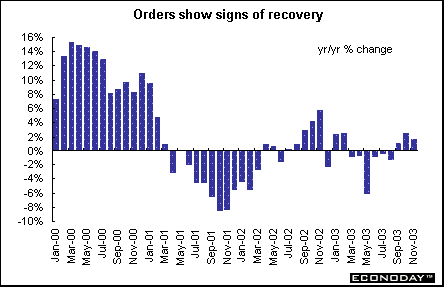
November seasonally adjusted merchandise trade surplus dropped to �9.74 billion from October's surplus of �9.97 billion. Exports were up 4.1 percent and 0.9 percent on the year while imports jumped 5.6 percent and 4.6 percent on the year.
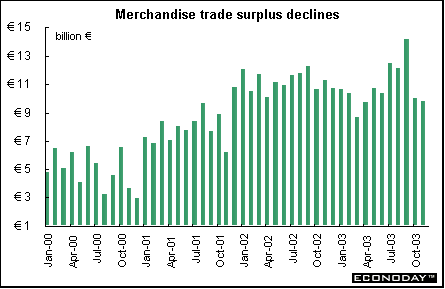
France - Third quarter final gross domestic product was up 0.4 percent but down 0.3 percent when compared with the same quarter a year ago. The third quarter increase was due to stronger private consumption and exports (mainly aeronautics and trains). The savings rate was 16.8 percent, up from 16.3 percent in the second quarter.
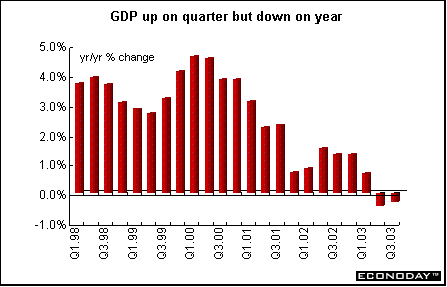
Britain - December Halifax house price index jumped 1.8 percent and was up 17.3 percent when compared with last year. For the three months through December, the index was up 15.4 percent when compared with the same three months a year ago. The housing market continues to be supported by low unemployment levels combined with historically low interest rates and home affordability.
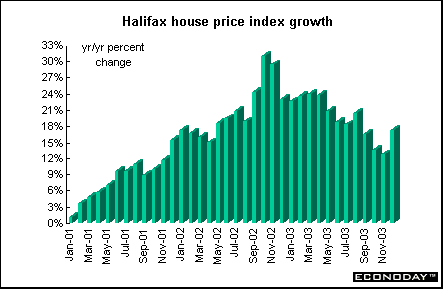
November global merchandise trade deficit soared to Stg4.411 billion from Stg4.249 billion in October. Exports dropped 2 percent while imports declined 0.8 percent. The oil surplus declined to Stg222 million in November from Stg235 million in October. Oil exports fell sharply, dropping 21.4 percent to Stg976 million from Stg1.241 million in October. The trade in services surplus expanded to Stg1.107 billion from Stg984 million October.
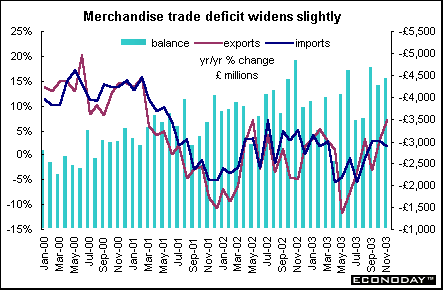
Asia/Pacific
Australia - November retail sales rose 1.4 percent, the biggest gain in a year. Retail sales were up for an 11th successive month. Sales increased 8.6 percent when compared with last year. Tourists visiting for the rugby World Cup spent at bars and restaurants in November. The increases in Australian interest rates over the last few months have had no effect on sales. Fueling spending in November were sales at recreational goods stores (includes sports goods stores and toy retailers), which jumped 3.9 percent, and sales at hotels, bars and restaurants, increasing 2.2 percent.
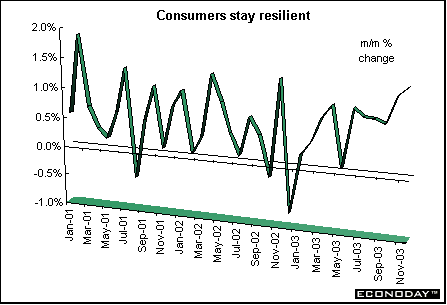
November goods and services trade deficit widened to A$1.73 billion ($1.33 billion) from A$1.7 billion in October. The rising value of the Australian dollar cut into export earnings. Exports of rural goods, including meat, wool and wheat, declined 5 percent. Exports of non-rural goods, which include gold, iron ore and fuel, gained 1 percent. Exports of services, which include tourism spending, dropped 3 percent. Imports were little changed at A$13.38 billion in the month. Imports of consumer goods dropped 2 percent and imports of capital goods, which include machinery, telecommunications equipment and vehicles, increased 8 percent.
Americas
Canada - November industrial product price index (IPPI) was down 0.4 percent and dropped 4.0 percent when compared with last year. The declines were largely the result of the continuing climb of the Canadian dollar against the U.S. dollar. Prices for motor vehicles and other transport equipment continued to drop. On the year, November represents the eighth consecutive month of decline. Lower prices persisted for motor vehicles and other transport equipment, electrical and communication products, pulp and paper products as well as primary metal products.
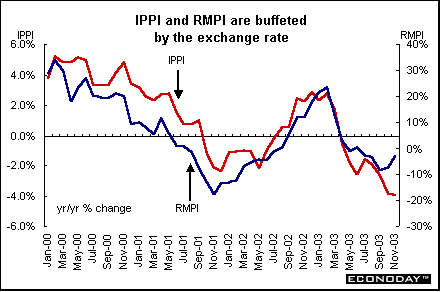
November raw materials price index (RMPI) jumped 1.5 percent with mineral fuels responsible for about half of the jump. Crude oil prices rose 2.1 percent as a result of higher demand and tight inventories. Higher prices for non-ferrous metals, wood products as well as vegetable products also contributed to this increase. However, on the year the RMPI dropped 3.2 percent. Lower prices for vegetable products, animals and animal products and wood products were the major contributors to this decline. The declines were partly offset by higher prices for non-ferrous metals, non-metallic minerals and ferrous materials.
Between October and November, the value of the U.S. dollar continued to weaken against the Canadian dollar, pushing down prices of commodities that are quoted in U.S. dollars, notably motor vehicles and lumber products. As a result, the total IPPI excluding the effect of the exchange rate would have risen 0.1 percent instead of decreasing 0.4 percent. However, on a 12-month basis, the influence of the dollar is much stronger. Consequently, the IPPI excluding the effect of the exchange rate would have increased 1.0 percent rather than declining 4.0 percent from November 2002 to November 2003.
December employment was up by an estimated 53,100. Job gains over the past four months have totaled 219,000 jobs, four times the increase of 52,000 observed during the first eight months of the year. Almost all of the job gains were in full-time work. The unemployment rate edged to 7.4 percent from 7.5 percent in the previous month.
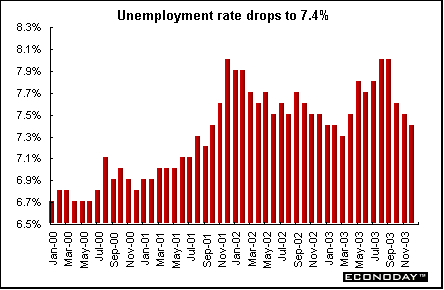
Bottom line
After the first week of trading, business as usual prevails in the financial markets - disappointment with tepid U.S. indicators and a horrible employment report. And now with the earnings season upon us, investors will be looking for good news to bolster their optimism, especially in the technology sector where stocks are once again rising at a (too') rapid rate.
Investors will continue to focus on the declining value of the dollar and try to measure the impact of the increasing value of the euro on earnings and on market share. Currency market players are already anticipating a G-7 finance ministers meeting at the beginning of February. After expressing disappointment at the lack of a vigorous statement from the ECB, investors now look for the G-7 to say something definitive about the increasingly rapid decline of the dollar.
Looking Ahead: January 12 through January 16, 2004
